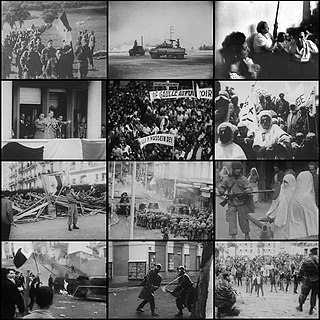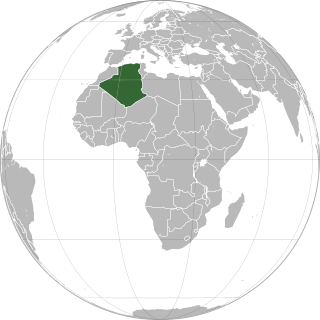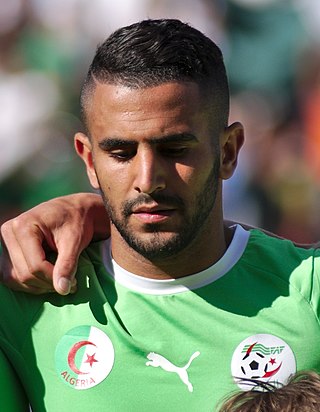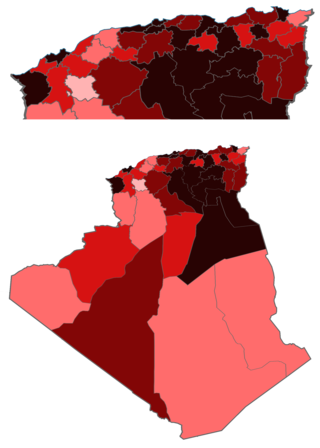
Algeria, officially the People's Democratic Republic of Algeria, is a country in North Africa. Algeria is bordered to the northeast by Tunisia; to the east by Libya; to the southeast by Niger; to the southwest by Mali, Mauritania, and Western Sahara; to the west by Morocco; and to the north by the Mediterranean Sea. It is considered part of the Maghreb region of North Africa. It has a semi-arid geography, with most of the population living in the fertile north and the Sahara dominating the geography of the south. Algeria covers an area of 2,381,741 square kilometres (919,595 sq mi), making it the world's tenth largest nation by area, and the largest nation in Africa, being more than 200 times as large as the smallest country in the continent, The Gambia. With a population of 44 million, Algeria is the ninth-most populous country in Africa, and the 32nd-most populous country in the world. The capital and largest city is Algiers, located in the far north on the Mediterranean coast.

Albert Camus was a French philosopher, author, dramatist, and journalist. He was awarded the 1957 Nobel Prize in Literature at the age of 44, the second-youngest recipient in history. His works include The Stranger, The Plague, The Myth of Sisyphus, The Fall, and The Rebel.

Algiers is the capital and largest city of Algeria. The city's population at the 2008 Census was 2,988,145 and in 2020 was estimated to be around 4,500,000. Algiers is located on the Mediterranean Sea and in the north-central portion of Algeria.

The Atlas Mountains are a mountain range in the Maghreb in North Africa. It separates the Sahara Desert from the Mediterranean Sea and the Atlantic Ocean; the name "Atlantic" is derived from the mountain range. It stretches around 2,500 km (1,600 mi) through Morocco, Algeria and Tunisia. The range's highest peak is Toubkal, which is in central Morocco, with an elevation of 4,167 metres (13,671 ft). The Atlas mountains are primarily inhabited by Berber populations. The terms for 'mountain' are Adrar and adras in some Berber languages, and these terms are believed to be cognates of the toponym Atlas. The mountains are also home to a number of animals and plants which are mostly found within Africa but some of which can be found in Europe. Many of these species are endangered and a few are already extinct. The weather is cooling but has sunny summers, and the average temperature there is 25°C.

The Algerian War, also known as the Algerian Revolution or the Algerian War of Independence, and sometimes in Algeria as the War of 1 November, was fought between France and the Algerian National Liberation Front from 1954 to 1962, which led to Algeria winning its independence from France. An important decolonization war, it was a complex conflict characterized by guerrilla warfare and war crimes. The conflict also became a civil war between the different communities and within the communities. The war took place mainly on the territory of Algeria, with repercussions in metropolitan France.

French Algeria, also known as Colonial Algeria, was the period of French colonisation of Algeria. French rule in the region began in 1830 with the invasion of Algiers and lasted until the end of the Algerian War of Independence in 1962. While the administration of Algeria changed significantly over the 132 years of French rule, the Mediterranean coastal region of Algeria, housing the vast majority of its population, was an integral part of France from 1848 until its independence.

The Maghreb, also known as the Arab Maghreb and Northwest Africa, is the western part of North Africa and the Arab world. The region includes Algeria, Libya, Mauritania, Morocco, and Tunisia. The Maghreb also includes the disputed territory of Western Sahara and the Spanish cities Ceuta and Melilla. As of 2018, the region had a population of over 100 million people.
The Pieds-Noirs, are the people of French and other European descent who were born in Algeria during the period of French rule from 1830 to 1962; the vast majority of whom departed for mainland France as soon as Algeria gained independence or in the months following.

The National Liberation Front is a nationalist political party in Algeria. It was the principal nationalist movement during the Algerian War and the sole legal and ruling political party of the Algerian state until other parties were legalised in 1989. The FLN was established in 1954 from a split in the Movement for the Triumph of Democratic Liberties from members of the Special Organisation paramilitary; its armed wing, the National Liberation Army, participated in the Algerian War from 1954 to 1962. After the Évian Accords of 1962, the party purged internal dissent and ruled Algeria as a one-party state. After the 1988 October Riots and the Algerian Civil War (1991–2002) against Islamist groups, the FLN was reelected to power in the 2002 Algerian legislative election, and has generally remained in power ever since, although sometimes needing to form coalitions with other parties.

Algeria, since December 18, 2019, is divided into 58 wilayas (provinces). Prior to December 18, 2019, there were 48 provinces. The 58 provinces are divided into 1,541 baladiyahs (municipalities). The name of a province is always that of its capital city.

The Algeria national football team represents Algeria in men's international football and is governed by the Algerian Football Federation. The team plays their home matches at the 5 July Stadium in Algiers and Miloud Hadefi Stadium in Oran. Algeria joined FIFA on 1 January 1964, a year and a half after gaining independence. They are the current champions of the FIFA Arab Cup.

The History of the Jews in Algeria refers to the history of the Jewish community of Algeria, which dates to the 1st century CE. In the 15th century, many Spanish Jews fled to the Maghreb, including today's Algeria, following expulsion from Spain and Portugal; among them were respected Jewish scholars, including Isaac ben Sheshet (Ribash) and Simeon ben Zemah Duran (Rashbatz).

The Algerian Football Federation (AFF); is the governing body of football in Algeria. It was formed in 1962 and was based in the capital Algiers. It has jurisdiction on the Algerian football league system and is in charge of the men's and women's national teams. Although an unofficial national team had played fixtures since 1958, the first recognized international took place in January 1963, some six months after independence. In 2021, twenty structures were added to the Algerian Football Federation. Algeria has to work with new players but has already qualified for AFCON 2021. AFCON stands for Africa Cup of Nations. Algeria has 17 players in French Ligue 1. The Algerian Football Federation is considered a member of FIFA.

The Sand War or the Sands War was a border conflict between Algeria and Morocco in October 1963. It resulted largely from the Moroccan government's claim to portions of Algeria's Tindouf and Béchar provinces. The Sand War led to heightened tensions between the two countries for several decades. It was also notable for ushering in the first multinational peacekeeping mission carried out by the Organisation of African Unity.

The Kabyle people are a Berber ethnic group indigenous to Kabylia in the north of Algeria, spread across the Atlas Mountains, 160 kilometres (100 mi) east of Algiers. They represent the largest Berber-speaking population of Algeria and the second largest in North Africa.

Jeunesse Sportive de Kabylie, , known as JS Kabylie or JSK, is an Algerian professional football club based in Tizi Ouzou. The club is named after the cultural, natural and historical region that is home to the Kabyle Berber people speaking Kabyle. The club was founded in 1946 and its colours are yellow and green. Their home stadium, 1 November 1954 Stadium, has a capacity of 25,000 spectators. The club is currently playing in the Algerian Ligue Professionnelle 1. It is the most successful football club in Algeria.

The cuisine of Algeria is influenced by Algeria's interactions and exchanges with other cultures and nations over the centuries. It is characterized by a wealth derived from both land and sea products. Conquests or demographic movement towards the Algerian territory were two of the main factors of exchanges between the different peoples and cultures. This cuisine is a Mediterranean and North African cuisine with Berber roots.

Riyad Karim Mahrez is a professional footballer who plays as a winger for Premier League club Manchester City and captains the Algeria national team.

The COVID-19 pandemic in Algeria is part of the worldwide pandemic of coronavirus disease 2019 caused by severe acute respiratory syndrome coronavirus 2. The virus was confirmed to have spread to Algeria in February 2020. In December it was announced that Algeria intended to launch COVID-19 vaccinations in January 2021.
On 29 January 2021, Algeria launched a COVID-19 vaccination campaign, a day after receiving its first shipment of 50,000 doses of the Russia's Sputnik V vaccine. As of 6 June 2021, around 2.5 million doses have been administered. Algeria is currently vaccinating its population with both Sputnik V and Oxford-AstraZeneca vaccines.



















